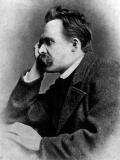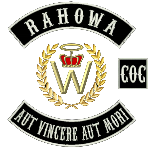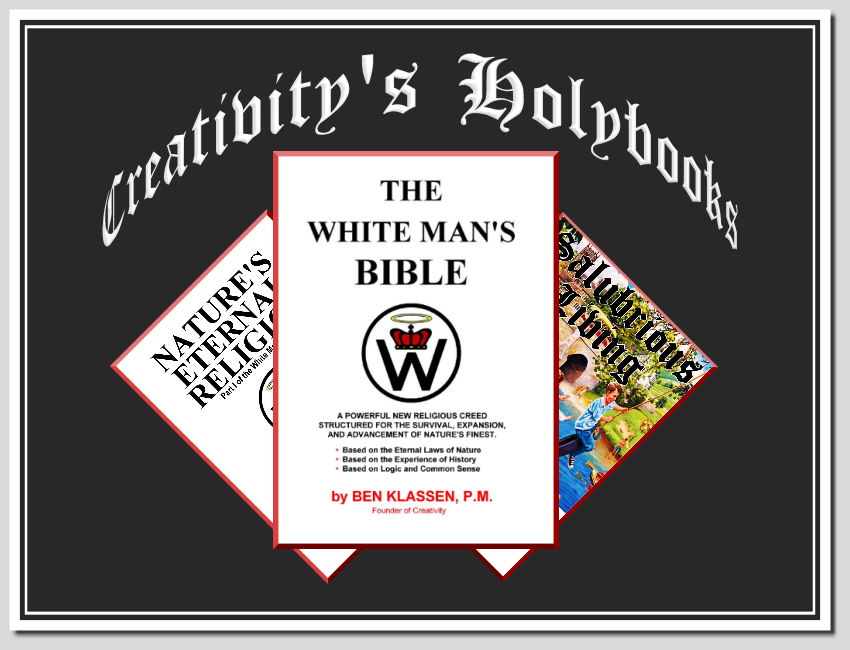- Welcome to Creator Forum - Racial Loyalty News Online.
• Shortened Link: W23.link » CreativityAlliance.com
• Beat the Censors on Social Media with ᵂ23 ᴰᴼᵀ ᴸᴵᴺᴷ
• Free @Rev.JoelDufresne P.O.W. USA - Prison Martyr - Bogus Charges
• Beat the Censors on Social Media with ᵂ23 ᴰᴼᵀ ᴸᴵᴺᴷ
• Free @Rev.JoelDufresne P.O.W. USA - Prison Martyr - Bogus Charges
-
 Democrats Can't Make Up Their Minds - Epstein Loved/Hated Trump
by G.L.R.
Democrats Can't Make Up Their Minds - Epstein Loved/Hated Trump
by G.L.R.
[Today at 2:08] -
 Br. Anthony S. - Prisoner of the J.O.G.
by Br.AnthonyS
Br. Anthony S. - Prisoner of the J.O.G.
by Br.AnthonyS
[Today at 0:38] -
 The Kaiser - Your Pro-White AI Assistant
by TheKaiserBot
The Kaiser - Your Pro-White AI Assistant
by TheKaiserBot
[Today at 0:15] -
 National Anti-Gang/Anti-White Taskforce
by Rev.FrankSmith
National Anti-Gang/Anti-White Taskforce
by Rev.FrankSmith
[Yesterday at 13:56] -
 Now Playing: Music and Videos
by Br.IanVonTurpie
Now Playing: Music and Videos
by Br.IanVonTurpie
[Yesterday at 9:51] -
 N.S. Network
by Br.IanVonTurpie
N.S. Network
by Br.IanVonTurpie
[Yesterday at 8:03] -
 Meet Australian Aborigines
by Rev.Cambeul
Meet Australian Aborigines
by Rev.Cambeul
[Sun 16 Nov 2025] -
 Latin for the Modern Creator
by Rev.Cambeul
Latin for the Modern Creator
by Rev.Cambeul
[Sun 16 Nov 2025] -
 Border Patrol Sending Agents & Armored Vehicles to Charlotte...
by G.L.R.
Border Patrol Sending Agents & Armored Vehicles to Charlotte...
by G.L.R.
[Sun 16 Nov 2025] -
 2023-11-16 England: James Costello - 5 Years Prison for Advertising...
by JamesCostello
2023-11-16 England: James Costello - 5 Years Prison for Advertising...
by JamesCostello
[Sun 16 Nov 2025] -
 British Humour
by Rev.Cambeul
British Humour
by Rev.Cambeul
[Sat 15 Nov 2025] -
 Tucker Carlson
by Rev.FrankSmith
Tucker Carlson
by Rev.FrankSmith
[Sat 15 Nov 2025] -
 The Way of Men by Jack Donovan
by Rev.JoelDufresne
The Way of Men by Jack Donovan
by Rev.JoelDufresne
[Fri 14 Nov 2025] -
 Is God Black?
by Br.IanVonTurpie
Is God Black?
by Br.IanVonTurpie
[Fri 14 Nov 2025]
Keep Creativity Online

Bitcoin/BTC Address:
3GyxbqYH3Hg6dpxVvS6PkFZ5FGbX1FLZ5N
Don't be a Jew - Donate Today

Bitcoin/BTC Address:
3GyxbqYH3Hg6dpxVvS6PkFZ5FGbX1FLZ5N
Don't be a Jew - Donate Today
Niggers Hate Carding Because it's "Racist"
Started by W.Anthony, Tue 01 Sep 2015
Previous topic - Next topic
User actions







